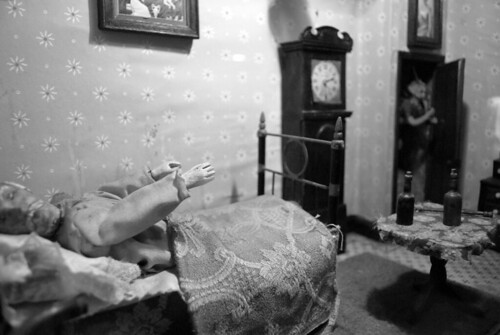
{Photo by rocketlass.}
An essay on F Scott Fitzgerald's The Beautiful and Damned in Geoff Dyer's new collection, Otherwise Known as the Human Condition (and, let's be honest, the quiet persistence of the Fuck Yeah Fitzgerald tumblr) led me to that novel last week. I tend to think of myself as someone who is regularly reading Fitzgerald, but the encounter with this novel made me realize that I usually engage with only a small portion of his work: The Great Gatsby, perpetually re-read and never exhausted; and his lingering mess, The Crack-Up and the notebooks. Each is in its own way perfection: the only flaw in Gatsby is a slight overheatedness, for which the jeweled sentences and the gentle complicity of Nick Carraway more than make up, while the minor matters in The Crack-Up and the notebooks are perfect in their small compass of imperfection, full of striking fragments and unforgettable lines unmoored from unfinished stories.
To read The Beautiful and Damned is to re-encounter the imperfect Fitzgerald, the Fitzgerald who was learning his craft, his generation, and his own self all at the same time. Dyer puts it well:
For more than a hundred pages, The Beautiful and Damned does not represent any kind of advance on This Side of Paradise. Isolated moments of insight cannot disguise its stylistic and structural flimsiness. The reader's heart sinks when, after less than twenty pages, Fitzgerald abandons novelistic prose and inserts one of the little playlets that should have been edited out of his first novel.* . . . Unleashed as soon as Gloria sets foot in the book, Fitzgerald's tendency to effulgence is, at first, ironically refracted through Anthony's consciousness: "Surely the freshness of her cheeks was a gossamer projection from a land of delicate and undiscovered shades; her hand gleaming on the stained table-cloth was a shell from some far and wildly virginal sea." Shortly afterward it takes on the tone of Fitzgerald's own lyrical yearning. A cab "moved off like a boat on a labyrinthine ocean"; Gloria "turned up her face to him, pale under the wisps and patches of light that trailed in like moonshine through a foliage." Fitzgerald never entirely grew out of this kind of thing--he would have been a lesser writer if he had--but he did learn to control it, to ground the lushest imagery in the actual and immediate.There's so much more purple prose from the early going that Dyer could have cited. Want more gossamer? Here:
There were silences as murmurous as sound. There were pauses that seemed about to shatter and were only to be snatched back to oblivion by the tightening of his arms about her and the sense that she was resting there as a caught, gossamer feather, drifted in out of the dark.Yet even as those sentences set the eyes rolling, others show signs of Fitgerald's mature lyricisim--and, as Dyer writes, a grounding in the immediate. Take this, from the page following the gossamer feather:
The stark and unexpected miracle of a night fades out with lingering death of the last stars and the premature birth of the first newsboys. The flame retreats to some remote and platonic fire; the white heat has gone from the iron and the glow from the coal.Just when the prose starts to feel too puffed up, Fitzgerald brings on the newsboys to deflate it; then, almost unnoticed, he inverts our notions of night and day, dark and light, hot and cold, giving the power and the glory, fading out, to the night and leaving the day the hangover-wracked imposition that his characters feel it to be.
The novel does, as Dyer notes, pick up considerably a ways in, and its tale of the disintegration of, respectively, Anthony, Gloria, and their marriage, has all the brutality, but none of the didacticism, of a temperance tract like The Tenant of Wildfell Hall. Light party scenes--of the recognizably 1920s sort that Waugh and Powell treated comically and Fitzgerald's friend Edmund Wilson treated seriously, ending up with a sort of Fitzgerald-lite--give way to scene after scene of unalloyed disssipation. The overriding impression is of people who have been entirely unfitted, by education, upbringing, and culture, for the daily round of life, and of the powerful lure of failure--and, as Dyer puts it, "the capacity of failure to generate some kind of hideous enlightenment." By the end of the novel, its imperfections are forgotten, and all that's left is the coppery taste of destruction, pain, and emptiness portrayed with brutal precision.